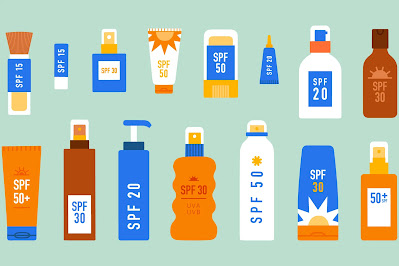As the summer season approaches, it's crucial to prioritize sun protection to safeguard our skin from harmful UV rays. Sunscreen plays a vital role in shielding our skin from the damaging effects of the sun. In this comprehensive guide, we will explore the importance of sunscreen, different types available, and essential factors to consider when choosing the right sunscreen for your needs.
Importance of Sunscreen:
1. Protection against UV Rays:
Exposure to the sun's ultraviolet (UV) radiation can lead to a range of skin concerns, including premature aging, sunburns, dark spots, and an increased risk of skin cancer. Sunscreen acts as a barrier that reflects or absorbs these harmful rays, reducing their penetration into the skin.
2. Prevention of Premature Aging:
Sunscreen helps minimize the appearance of wrinkles, fine lines, and other signs of premature aging caused by prolonged sun exposure. It maintains the skin's elasticity, preventing the breakdown of collagen and elastin fibers.
3. Reduction of Skin Cancer Risk:
Prolonged exposure to UV radiation is a significant risk factor for developing skin cancer. Regular use of sunscreen can significantly reduce this risk by creating a protective layer on the skin's surface.
Types of Sunscreen:
1. Chemical Sunscreens:
These sunscreens work by absorbing UV rays and converting them into heat, which is then released from the skin. Common active ingredients include avobenzone, octinoxate, and oxybenzone. Chemical sunscreens are lightweight, easy to apply, and often blend seamlessly into the skin.
2. Physical Sunscreens:
Physical sunscreens, also known as mineral or natural sunscreens, create a physical barrier on the skin's surface that reflects and scatters UV rays. The main ingredients are typically zinc oxide or titanium dioxide. They offer immediate protection upon application and are suitable for individuals with sensitive skin.
Factors to Consider When Choosing Sunscreen:
1. Sun Protection Factor (SPF):
SPF measures a sunscreen's ability to protect against UVB rays. Higher SPF values indicate greater protection. It is recommended to use a broad-spectrum sunscreen with an SPF of 30 or higher to shield against both UVB and UVA rays.
2. Broad-Spectrum Protection:
Ensure that your chosen sunscreen provides broad-spectrum protection, meaning it shields against both UVA and UVB rays. UVA rays contribute to premature aging and some forms of skin cancer, while UVB rays cause sunburns.
3. Water Resistance:
If you plan on swimming or participating in outdoor activities that involve sweating, opt for a water-resistant sunscreen. These products offer extended protection even when exposed to water, though reapplication is still necessary after a certain time or as indicated on the product label.
4. Skin Type and Sensitivities:
Consider your skin type and any specific sensitivities when selecting a sunscreen. For oily skin, choose lightweight, oil-free formulas. Individuals with dry or sensitive skin may benefit from moisturizing or hypoallergenic options. Always perform a patch test if you have a history of skin allergies.
5. Application and Texture:
Choose a sunscreen that suits your preferences in terms of texture and application method. Whether it's lotion, cream, gel, or spray, ensure it is easy to apply and comfortable on your skin. Remember to follow the application instructions provided by the manufacturer for optimal effectiveness.
Here is some additional information about sunscreen that you might find helpful:
1. Sunscreen and Vitamin D:
Some individuals are concerned that using sunscreen may lead to vitamin D deficiency since sun exposure is essential for the body to produce vitamin D. While it's true that sunscreen can reduce the skin's ability to produce vitamin D, most people can still maintain optimal levels through a balanced diet and limited sun exposure outside of peak hours (usually early morning or late afternoon).
If you're concerned about this, consult with your healthcare provider to determine if you need additional vitamin D supplementation.
2. The Importance of Proper Application:
To maximize the effectiveness of sunscreen, it's crucial to apply it correctly. Most people tend to use less sunscreen than recommended, which significantly lowers the protection level.
The general rule of thumb is to apply about two tablespoons (30 milliliters) of sunscreen to cover the entire body. Remember to focus on commonly overlooked areas like the ears, neck, back of the hands, and feet.
Reapply every two hours or more frequently if swimming, sweating excessively, or rubbing the skin with a towel.
3. Sunscreen Shelf Life:
Sunscreen has an expiration date printed on the packaging. It's essential to check and replace expired products as their effectiveness diminishes over time.
Additionally, extreme temperature conditions, such as leaving sunscreen in a hot car, can degrade its active ingredients. To ensure optimal protection, store sunscreen in a cool, dry place.
4. Sun Protection Beyond Sunscreen:
While sunscreen is a crucial component of sun protection, it's important to remember that it should be used in conjunction with other sun-protective measures.
Seek shade during the sun's peak hours (usually between 10 am and 4 pm), wear protective clothing, such as wide-brimmed hats and long-sleeved shirts, and use sunglasses to shield your eyes from UV radiation. These practices, combined with sunscreen, provide comprehensive protection against the sun's harmful effects.
5. Considerations for Children:
Children require special attention when it comes to sun protection. Infants under six months of age should avoid direct sunlight altogether and rely on other forms of sun protection, such as shade and protective clothing.
For older children, choose sunscreen specifically formulated for their delicate skin and ensure adequate coverage, especially during outdoor activities. Encourage good sun safety habits from a young age to instill a lifelong understanding of the importance of sun protection.
Remember, sunscreen is a year-round necessity, not just during summer or sunny days. Even on cloudy or overcast days, UV rays can still penetrate the clouds, so don't skip sunscreen. Prioritizing sun protection is a key step toward maintaining healthy and youthful-looking skin while reducing the risk of skin damage and potentially life-threatening conditions like skin cancer.
Always consult with your dermatologist or healthcare provider for personalized advice on sunscreen usage and sun protection in accordance with your specific needs and conditions.
Conclusion
In conclusion, it is imperative to recognize the importance of using sunscreen as a vital step in preserving the health and appearance of our skin. By understanding the significance of protecting ourselves from harmful UV rays, we can take proactive measures to prevent sun damage, premature aging, and the risk of skin cancer.
Throughout this guide, we have explored various key aspects related to sunscreen, including its formulation, application techniques, and appropriate SPF levels. We have also discussed the significance of considering different skin types and conditions when selecting the right sunscreen product.
Remember, sunscreen is not just a seasonal necessity; it should be incorporated into our daily skincare routine, regardless of the weather or our activities. Finding a sunscreen that suits our individual needs, whether it be in terms of texture, fragrance, or specific additional benefits, will further encourage consistent usage. Moreover, embracing the habit of reapplying sunscreen every few hours or after sweating or swimming will ensure continuous protection.
Ultimately, our commitment to using sunscreen consistently and effectively demonstrates self-care and a proactive approach towards maintaining healthy skin. With the knowledge gained from this guide, I encourage you to make sunscreen an essential part of your skincare routine. Embrace the power of sunscreen, and bask in the confidence and peace of mind that comes with knowing you are safeguarding your skin against the damaging effects of the sun.
Sources:
1. American Academy of Dermatology Association. (n.d.). Sunscreen FAQs. Retrieved from https://www.aad.org/public/
2. Mayo Clinic. (2020, July 29). Sunscreen: How to Choose. Retrieved from https://www.mayoclinic.org/
3. Skin Cancer Foundation. (n.d.). What Is Sunscreen? Retrieved from https://www.skincancer.org/
4. U.S. Food and Drug Administration. (n.d.). How to Select a Sunscreen. Retrieved from https://www.fda.gov/drugs/


0 Comments
Post a Comment